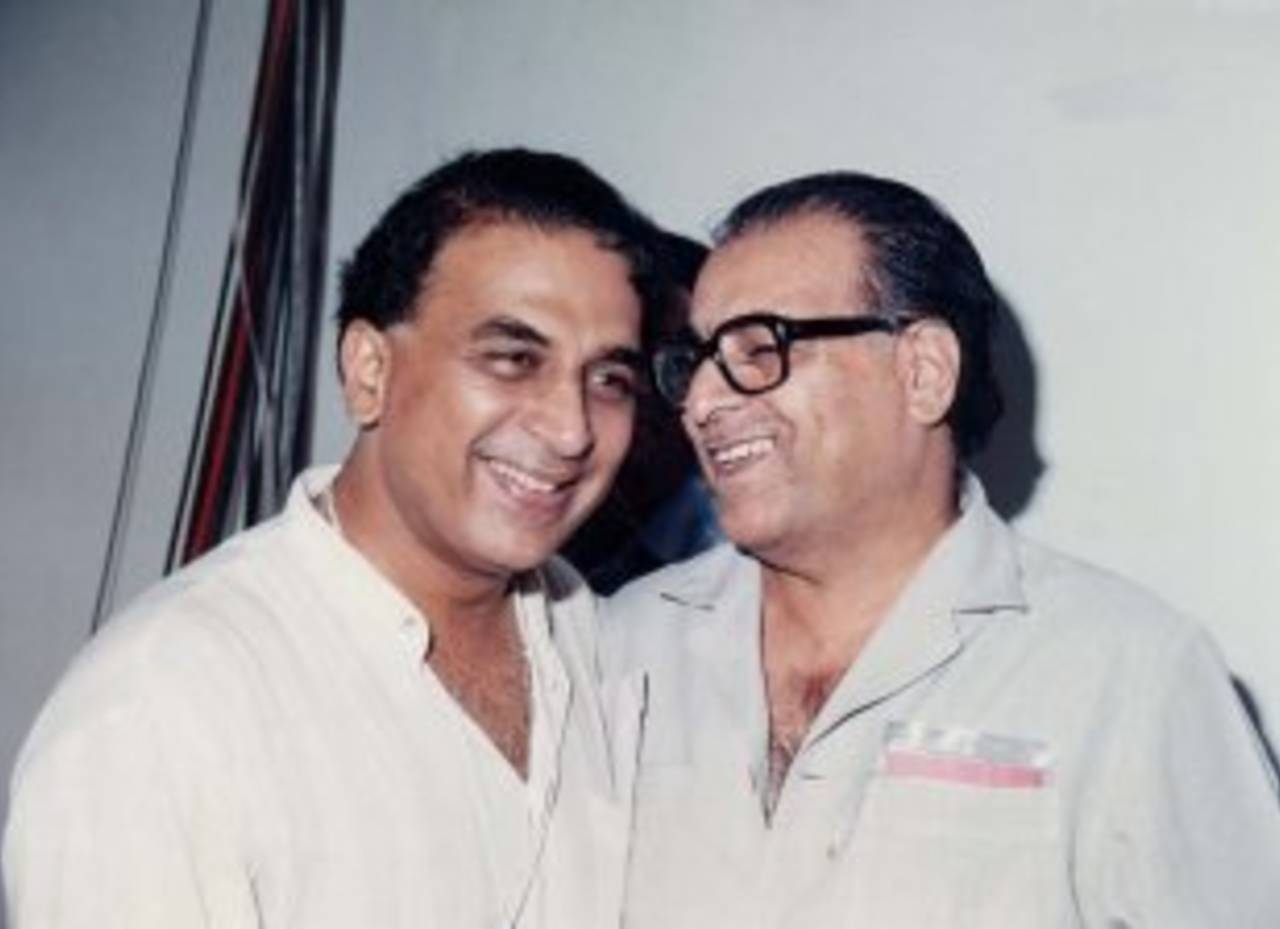A servant of cricket
Commentator Munir Hussain devoted his life to the game, celebrating its magic and beauty
Saad Shafqat
06-Aug-2013

Munir Hussain with Sunil Gavaskar: he could not get enough of the game • Munir family archive
Pakistan may have won their ODI and T20 rubbers against West Indies last week, but the upbeat mood was quickly tempered by a major loss suffered by the country's cricketing fraternity and fans.
Munir Hussain, a pioneering commentator, groundbreaking publisher, Karachi City Cricket Association mandarin, and sagacious elder presence in the nation's cricket circles, died of natural causes at his home in Karachi on Monday, July 29. There was a sense of heartfelt loss, especially for those who he delighted in his witty commentary, and had been regaled by his wildly popular Urdu cricket magazine Akhbar-e-Watan.
Hussain was 83 and, but for arthritic knees that were beginning to limit his mobility, had been in reasonably good health. Just hours earlier, he had watched the second T20 international between West Indies and Pakistan on television, lauding the commentary of Ramiz Raja as well as bemoaning - in characteristic style - what he viewed as unforgivably declining standards in the Pakistan team.
Hussain's life is an inspiration to people everywhere who dream big dreams and aspire to create an impact. Born in Amritsar in November 1929, he moved to Delhi while still very young and grew up in the Karol Bagh neighbourhood. In 1947 he migrated to Pakistan, taking a train from Amritsar, the details of which harrowing journey are part of his family lore.
Movies and cricket quickly emerged as his favourite pastimes, but it was journalism that became his singular passion. This found expression through magazine publishing, column writing and, later, broadcasting.
His earliest success was a magazine titled Filmasia, devoted to the film industry in both India and Pakistan. During his Karol Bagh days, he had become friends with Mir Khalilur Rahman, who became a leading media baron and went on to found the Urdu newspaper Jang, Pakistan's largest-circulation daily in any language. In it, Hussain wrote an influential weekly cricket column that ran for four decades and commanded a huge readership.
A diehard lover of the game, Hussain could not get enough of cricket and immersed himself in playing as well as administering it. As an administrator, he served the Karachi City Cricket Association over many years in various capacities, formal and otherwise, including two terms as president, and was regarded for most of his life as one of a handful of key figures in Karachi's cricket affairs.
As a player, Hussain was a club cricket regular and took pride in his ability get the ball to seam at pace. In 1969 he even appeared in a first-class game, representing Quetta (at the time called Kalat Division) and taking 2 for 64. According to a widely passed anecdote, during the rest day of a Test match sometime in the mid-1980s, Hussain once bowled to Imran Khan in the nets and was complimented by the great allrounder on his nip and direction.

A pioneer of Urdu commentary•Munir family archive
Hussain's landmark contribution undoubtedly was the initiation of cricket commentary in Urdu. Even until the late 1960s, commentary on Radio Pakistan and Pakistan television was exclusively in English, unintelligible to the vast majority of the country's cricket followers. When Hussain first proposed the idea of Urdu commentary, traditionalists were aghast. There was a strong feeling that English was the rightful medium for properly conveying the nuances of the game.
Yet Hussain remained undeterred. He had no patience for pedants and felt certain he was on to something. In 1969, he convinced the organisers of a local tournament, the Jang Gold Cup - whose matches were to be broadcast on radio and television - to give him a chance. He proved an instant hit, and a new art form was born.
The Urdu magazine Akhbar-e-Watan, the other major source of Hussain's cricketing fame, appeared in its cricket identity in late 1976. He had been producing it as a social-interest-and-current-affairs magazine for a while before his distribution agent suggested the idea of giving it a cricket flavour. New Zealand were touring Pakistan at the time, and Hussain published a cricket supplement on the occasion under the Akhbar-e-Watan masthead. In keeping with his Midas touch, this proved an instant hit as well. Bubbling with clever opinion, sharp interviews, catchy images, and comprehensive reportage, it acquired iconic status among players and fans alike.
Hussain is fondly remembered as a backer of unpopular causes, a supporter of the disenfranchised, and a nurturing humanist. He has left a remarkable legacy that lives on through his multiple endeavours. His son Iqbal Munir, an accomplished photojournalist who has attained his own rank and status as a cricket media figure, says his father was always keen to pass on his passion for advancement and innovation in the game, mentoring a new generation of commentators and journalists.
Hussain's enthusiasm for the game never dimmed until, literally, his dying day. He devoted his life to cricket, breaking some of its barriers and always celebrating its magic and beauty. The game is richer for it.
Saad Shafqat is a writer based in Karachi. His latest book is Breath of Death, a medical thriller